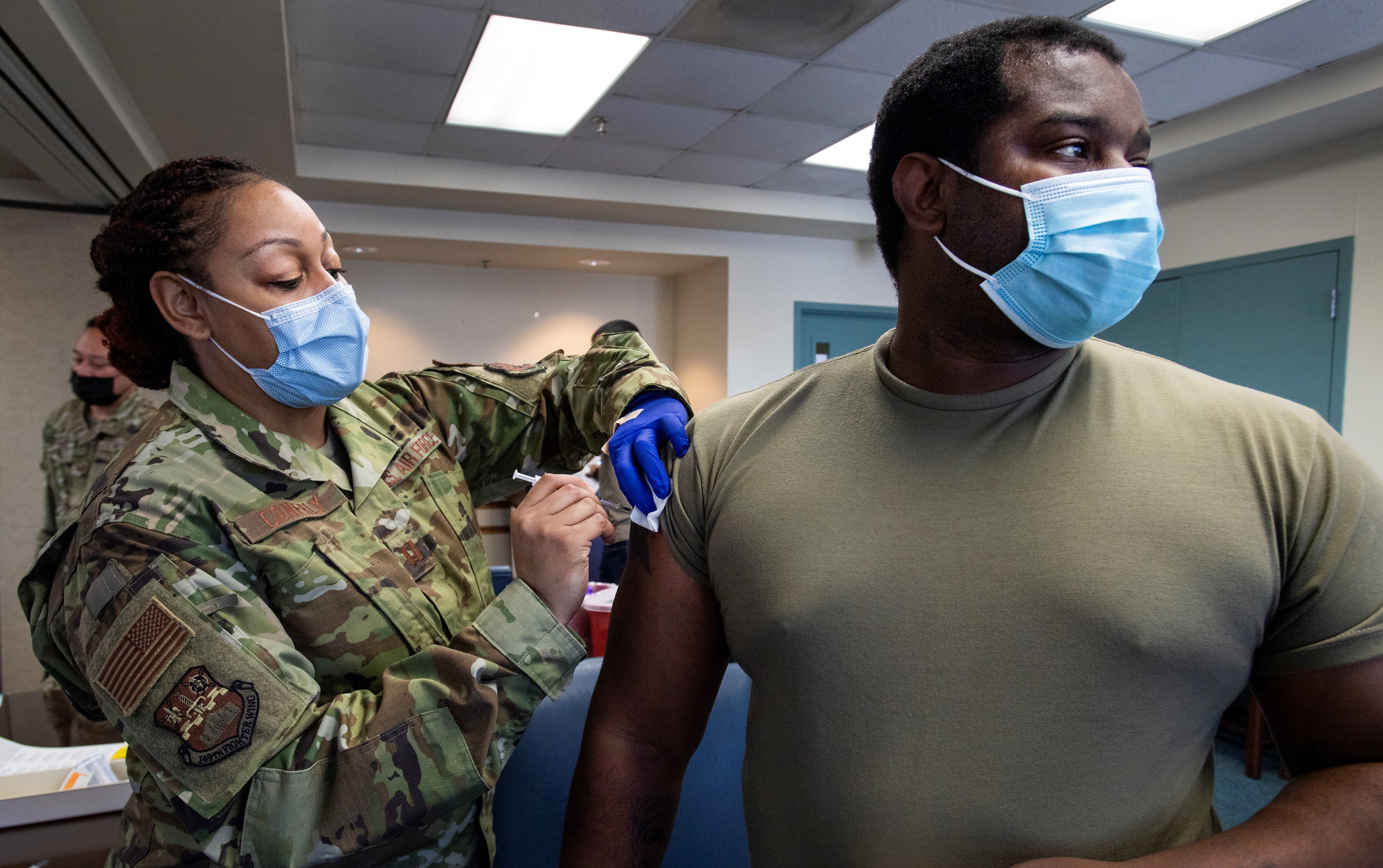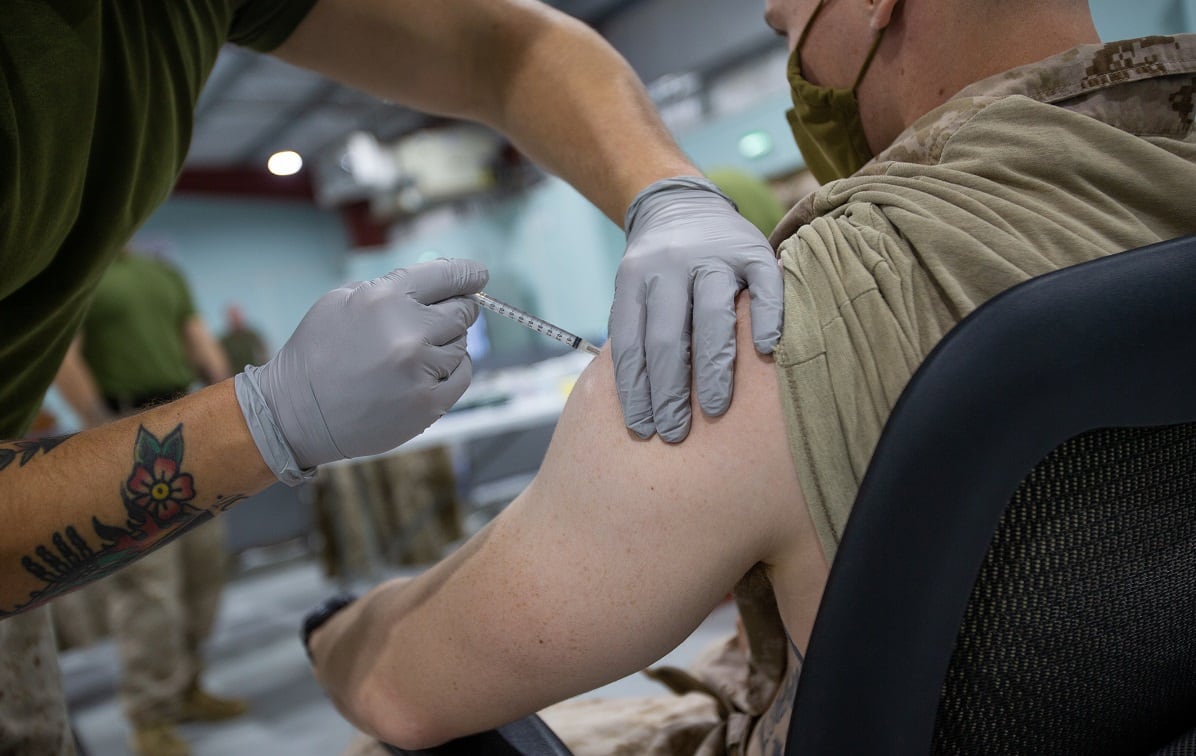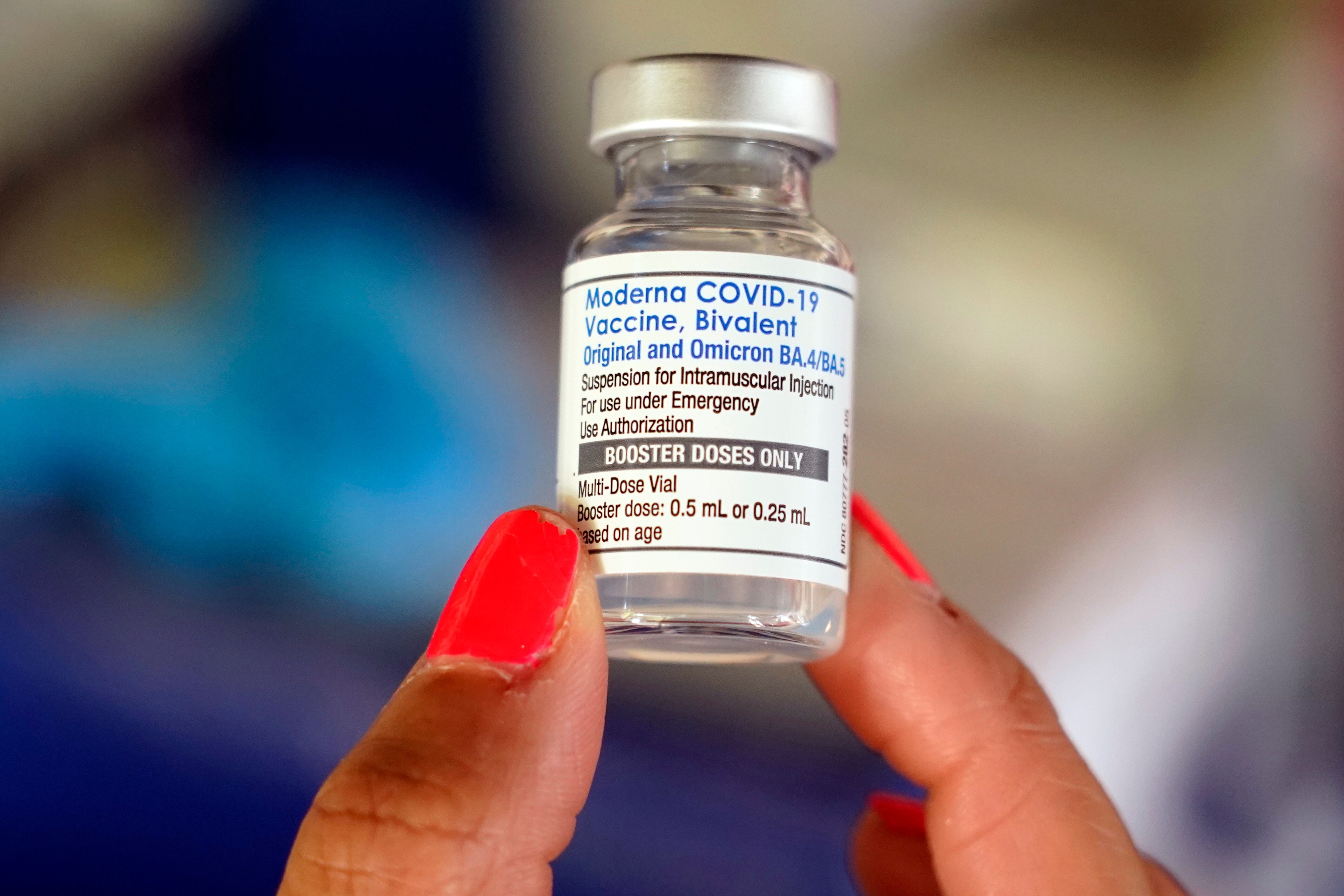Pentagon leaders on Wednesday voiced continued support for their decision to mandate the COVID-19 vaccine for service members in the face of a proposed law that would force the Defense Department to repeal the policy.
During a briefing with reporters, Pentagon spokesperson Sabrina Singh said vaccination is still a military readiness issue, and said a repeal could be harmful to the health of the armed forces.
“What is important to the readiness of the force is getting the vaccine,” she said.
“So, yes, it would impact the readiness of the force. You’re more prone to getting COVID-19 … and we certainly know that the vaccine will save your life.”
RELATED

One day after congressional leaders approved a repeal of the military’s COVID-19 vaccine mandate in their final draft of the annual defense authorization bill, officials across the executive branch bashed Republicans for jeopardizing the health and welfare of service members by forcing the move.
But the administration’s main foe in the fight appears to be House Democratic leaders, who are labeling the policy outdated and inconsistent and said they are comfortable with ending it.
“As we are here in December 2022, does that August 2021 [vaccine] policy still make sense?” House Armed Services Committee Chairman Adam Smith, D-Wash., said during a speech before the House Rules Committee defending the authorization bill. “We don’t believe that it is, and I don’t believe that it is.”
The rift among Democratic Party leaders comes just days after the White House announced a new six-week push to get more Americans inoculated with the latest bivalent COVID-19 vaccine, which they say will help curb serious side effects from the lingering virus.
In the 33 months since the pandemic began in America, more than 98 million cases of the virus have been recorded, and more than 1 million individuals have died from complications related to the virus, according to data from the Centers for Disease Control and Prevention.
Those totals include 451,600 cases among military members and 96 deaths. Administration officials ordered all troops to be vaccinated starting in fall 2021, calling it an issue of military readiness and public safety.
The policy was immediately controversial among conservative lawmakers, who decried the lack of flexible exemptions for individuals with religious or other objections.
Opponents of the vaccine have argued that because the vaccine is not overwhelmingly effective at preventing COVID-19 infection, and President Joe Biden has said publicly that the pandemic is “over,” there is no longer a need to mandate vaccination.
They also question the medical need for widespread vaccinations against COVID-19, noting that the virus generally produced its worst symptoms in the elderly and infirm, two groups that are not typically in the active-duty military force.
Service members are required to stay up-to-date on more than a dozen vaccinations, including those that haven’t seen a major outbreak in decades. The annual flu vaccination is required, for example, despite influenza posing the biggest threat to children and the elderly.
More than 8,000 active-duty individuals have been dismissed for vaccine refusal so far this year. Although that total is a small fraction of the full force, critics have charged that under the current strained recruiting environment, such dismissals are foolish.
Now it appears that some Democratic leaders in Congress — but not all — agree with that charge.
“The policy requiring that service members be vaccinated was absolutely the right policy,” Smith said on Wednesday. “It saved lives, and it made sure our force was as ready as it possibly could be in the face of the pandemic. …
“But right now the policy says if you got that first round of shots [months or years ago], then you’re good. And If you didn’t, you’re not. So, I think it’s time to update the policy.”
Smith’s support (which carries with it the backing of senior Democratic leaders in the chamber) comes after House and Senate Republicans in recent days had vowed to block the defense authorization bill — seen as must-pass policy annually — if a vaccine mandate repeal was left out of the measure.
RELATED

But Senate Democrats appeared ready to fight for the policy up until last weekend, when Smith said publicly that changes to the policy were up for debate in negotiations.
When the compromise legislation was announced Tuesday night, it contained language requiring the Defense Department to “rescind the mandate that members of the Armed Forces be vaccinated against COVID-19″ within 30 days of the bill’s passage.
“We continue to believe that repealing the vaccine mandate is a mistake,” White House National Security Council spokesman John Kirby told reporters Wednesday morning. “Making sure our troops are ready to defend this country and prepared to do so remains the president’s priority, and the vaccine requirement for COVID does just that.
“But Republicans in Congress have obviously decided that they’d rather fight against the health and well-being of those troops, instead of protecting them.”
Republican leaders celebrated the inclusion of the repeal amid the Democratic infighting.
In a statement, House minority leader Kevin McCarthy, R-Calif., called the move “a victory for our military and for common sense.” Senate Armed Services Committee ranking member Jim Inhofe, R-Okla., said the move “takes care of our troops” and will help with future recruiting efforts.
Meanwhile, when asked if he was frustrated by the vaccine language in the authorization bill, Senate Armed Services Committee Chairman Jack Reed, D-R.I., said simply “that’s the nature of a compromise bill.”
He noted that nearly 97% of the armed forces are fully vaccinated now, and most took the shots without complaint. He also noted that the language in the bill “requires the end of the mandate, but it doesn’t restrict the Defense Department going forward,” suggesting that troops could face different COVID-19 vaccine requirements in the future.
House and Senate Democrats omitted from the compromise bill demands from Republican lawmakers that all troops who were dismissed under the vaccine policy be reinstated with back pay.
Rep. Mike Rogers, R-Ala., the expected incoming chairman of the House Armed services Committee, said he plans to revisit that issue next year. Smith said he remains firmly against it.
“The service members who refused to [get vaccinated] and were discharged from service, that’s the way it has to work,” he said. “Orders are not optional in the military.
“And if Congress expresses the opinion that they are, I cannot imagine anything that would more significantly undermine the good order and discipline of our military.”
The House is expected to pass the authorization bill by the end of the week, with the Senate taking up the measure soon after.
Administration officials would not say whether the vaccinate mandate repeal was onerous enough to warrant a veto of the entire defense bill. White House Press Secretary Karine Jean-Pierre said Wednesday that officials “would let the process happen” on Capitol Hill and make a veto decision when the bill arrives for the president’s signature.
Leo covers Congress, Veterans Affairs and the White House for Military Times. He has covered Washington, D.C. since 2004, focusing on military personnel and veterans policies. His work has earned numerous honors, including a 2009 Polk award, a 2010 National Headliner Award, the IAVA Leadership in Journalism award and the VFW News Media award.
Meghann Myers is the Pentagon bureau chief at Military Times. She covers operations, policy, personnel, leadership and other issues affecting service members.





